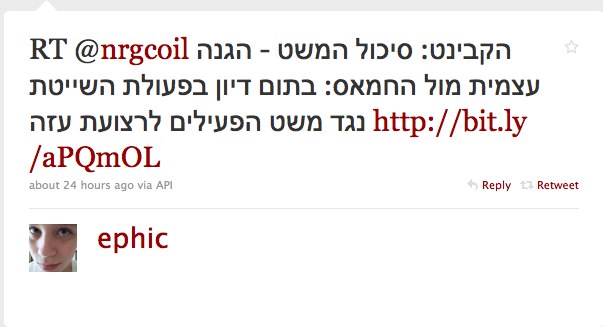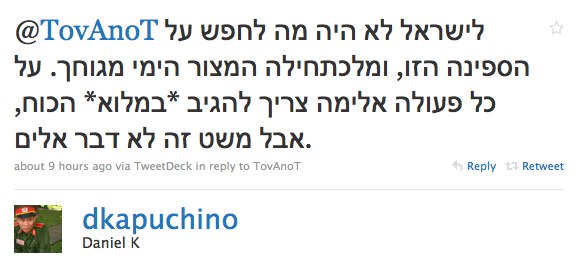The global impact that social media and the real time web had as this story evolved is undeniable. From Twitter to Facebook and onto active forums and talkback threads, the battleground has shifted from the Mediterranean to a digital cacophony of data. It is a battle over the truth, a war over the validity of facts, who is right and what is wrong. Who can get more attention to their version of the story, and who can take down the other's site. Choosing a side is as easy as joining a Facebook group. Showing one's support is as simple as ReTweeting a post or sharing a status update.
The flotilla orgnizers, the Israel Defense Force (IDF) and the world at large is witnessing the sheer power of the flow of information. Most importantly, they are realizing that in this day and age, its flow is impossible to block. Social media tools like Twitter and Facebook create immediate channels that give any user the ability post a message, friction free, and at little to no cost. Once online, messages can easily be passed on, through networks of friends and followers, mostly seen by a few, but sometimes reaching millions.
The term ‘Flotilla‘ has been trending on Twitter for 20 hours over the past day and a half. This in itself, is a huge victory for its organizers, and the Free Gaza movement. The implications of a topic trending globally are immense: massive visibility and attention. Tens of thousands of messages posted within hours, over half of them include links to websites.
When planning the operation, IDF placed an emphasis on making sure no updates would leak from the activists during the operation by means of electronic warfare. Israel was to be the first to deliver news on the turnout of events. Their intent was to block all forms of communication coming from the activist boats and let a group of journalists onboard the Israeli boats be the first to report to the world. To their chagrin, their plan did not succeed.
Avraham Pechter argues that Israel should have opened its communication channels ahead of time:
IDF should have started the operation with a continuous and open communication wave on TV and radio, accompanied by journalists that joined the forces. Describing the events in realtime to the whole world would prove IDF's claims – faced with a violent, organized trap that reached a life threatening situation necessitated opening fire – justified given the circumstances. Adding international journalists would have neutralized the worldwide hostility…
Yoni Ben-Menachem adds:
Its time to reorganize Israel's communications strategy, otherwise Israel will fight the de-legitimization happening against it with “empty hands”. Its time to crumble existing systems, waiting will cause further harm to Israel.
Roni writes:
Playing the provocateur's game – that's the biggest weakness. Israeli failed miserably with regards to PR. The foreign ministry, headed by one of the biggest militants our country ever saw, should be in charge of this subject. From reading newspapers around the world, all us Israelis seem like we support the operation. We have no right to act surprised that the world hates us – since there was no effort made at trying to explain our stance, or to compromise. When you look at the cold facts, Israel seems aggressive, illogical and fundamentalist. The problem with this government and country, and the extremists leading us to total loss, don't understand that we also need to get along with the world, not only fortify our opinions and say that we are right no matter what everyone else thinks.
Twitter is not popularly used by the mainstream in Israel, but has been adopted by Government offices and officials (@IsraelMFA, @IsraelConsulate, @Tzipi_Livni) and media outlets (@Haaretz, @liquid_rotter, @galey_zahal). Out of those posting on Twitter in Hebrew, many rephrase the media headlines like ephic:
RT @nrgcoil the cabinet: intercepting the flotilla – self defence against Hamas: at the end of a discussion on the IDF operation against the activist boats heading towards Gaza http://bit.ly/aPQmOL
Some chose snarky cynicism:
romanrap:
Who is supporting to send a humanitarian flotilla to help the kurds or armenians in Turkey? And of course, not stop when asked to. And if possible, place some clubs and knives on board.
And some provided critique:
dkapuchino:
Israeli shouldn't have been on that boat, and in any case, the Gaza siege is ridiculous. We should respond to violence with *full* force, but the flotilla was not violent.
Facebook is substantially more popular within Israel. Over the past couple days Facebook has been used to host discussions within profile pages and group pages. One Facebook group called to show support for the IDF and a smaller one gathered people who were calling for Bibi Netanyahu and Ehud Barak to resign. One of the largest groups (40,000 members) is pledging Israelis to support a boycott of Turkish goods, and includes the slogan: “I am not selling my national pride for a $500 all inclusive deal”.
Amir Mizroch writes about the power of the ‘#’ sign versus the ‘$’ sign, emphasizing Israel's lack of ability to prepare suitable communications:
Israeli commandos may not have known that members of the Free Gaza flotilla were carrying knives, guns, and metal bars. But they should have known that many in the incoming flotilla were armed with cameras, cell phones, blogs and Twitter accounts. For a country so technologically advanced, and with such acute public diplomacy challenges, to fail so miserably at preparing a communications offensive over new media is a failure of strategic proportions…
Social media is cheap and is antithetical to centralized bodies and subverts their authority. It is, so far, proving to be one of the asymmetrical weapons of choice for grassroots activists…
While Israel is justifiably known as the world’s “Start-up Nation” for its technological dynamism and entrepreneurship, we are being beaten hands down on the PR uses of this new technology. We may be a start up nation, but we are bricks and mortar communicators. Our adversaries have cntrl-alt-deleted us.
Kiwi tech blogger Luke Appleby describes the important role technology played:
the role of technology in this episode can't be overlooked – in fact, it was crucial.
It further demonstrates the impact social media and portable devices can have in aiding the free flow of information, especially in alerting the world to governmental actions, policies and decisions.
People are becoming selective in what they believe, taking information from a vast array of sources and making up their own minds, and that has to be a good thing.
The world is entering a new age – an age of accountability, rapid circulation and global connectivity. There is always someone watching, tweeting, blogging or uploading.
An interesting and relevant comment thread followed his post.
comment 1:
in regards to the technology, I agree with above comments – information is still bias and without an understanding of the wider context of the situation opinions are cheap.
comment 2:
These networks definitely work to the advantage of people trying to get a message out, but they are not necessarily high quality reports. They're likely to be biassed in favour of the reporter. I am not backing the Isrealis or anything, but the picture is still far too confusing to draw any conclusions.
However the vast amount of “information”, mostly trite, tends to bury the important stuff. After a few hours it has been wiped from the social consciousness.
Perhaps this is one reason why the Isrealis boarded so far off shore. Close inshore means more phones etc working making it easier to send voice/pictures/video. Far offshore limits the communications to specialised gear like sat phones etc.
Perhaps that is why Israel chose to intercept the boats in international waters. But the actual reason is still unknown.
As the activists reach their home countries, I am sure we will start receiving more information about what happened. Help us unveil all the pieces of information from the many sides of the story and keep sending us links to perspectives that have not been heard or highlighted.
See our special coverage page about the flotilla raid.










3 comments